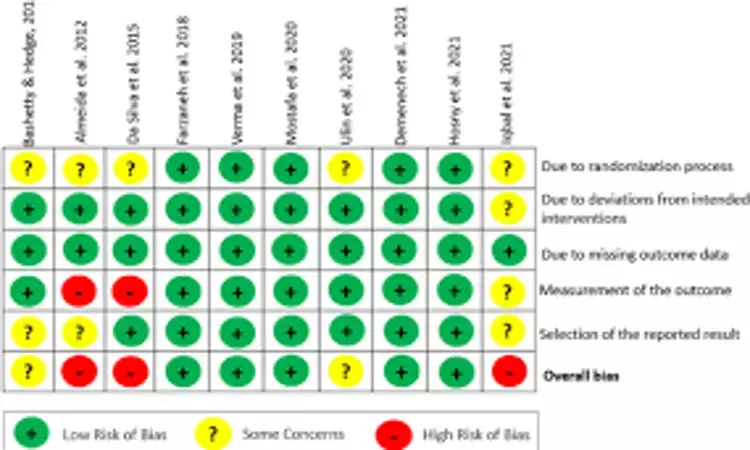- Home
- Medical news & Guidelines
- Anesthesiology
- Cardiology and CTVS
- Critical Care
- Dentistry
- Dermatology
- Diabetes and Endocrinology
- ENT
- Gastroenterology
- Medicine
- Nephrology
- Neurology
- Obstretics-Gynaecology
- Oncology
- Ophthalmology
- Orthopaedics
- Pediatrics-Neonatology
- Psychiatry
- Pulmonology
- Radiology
- Surgery
- Urology
- Laboratory Medicine
- Diet
- Nursing
- Paramedical
- Physiotherapy
- Health news
- Fact Check
- Bone Health Fact Check
- Brain Health Fact Check
- Cancer Related Fact Check
- Child Care Fact Check
- Dental and oral health fact check
- Diabetes and metabolic health fact check
- Diet and Nutrition Fact Check
- Eye and ENT Care Fact Check
- Fitness fact check
- Gut health fact check
- Heart health fact check
- Kidney health fact check
- Medical education fact check
- Men's health fact check
- Respiratory fact check
- Skin and hair care fact check
- Vaccine and Immunization fact check
- Women's health fact check
- AYUSH
- State News
- Andaman and Nicobar Islands
- Andhra Pradesh
- Arunachal Pradesh
- Assam
- Bihar
- Chandigarh
- Chattisgarh
- Dadra and Nagar Haveli
- Daman and Diu
- Delhi
- Goa
- Gujarat
- Haryana
- Himachal Pradesh
- Jammu & Kashmir
- Jharkhand
- Karnataka
- Kerala
- Ladakh
- Lakshadweep
- Madhya Pradesh
- Maharashtra
- Manipur
- Meghalaya
- Mizoram
- Nagaland
- Odisha
- Puducherry
- Punjab
- Rajasthan
- Sikkim
- Tamil Nadu
- Telangana
- Tripura
- Uttar Pradesh
- Uttrakhand
- West Bengal
- Medical Education
- Industry
Higher Concentration of Sodium Hypochlorite may Aggravate Postoperative Pain after Endodontic Treatment, suggests study

Higher Concentration of Sodium Hypochlorite may Aggravate Postoperative Pain after Endodontic Treatment, suggests a study published in the International Endodontic Journal.
To compare the effects of two different concentrations of NaOCl solution on postoperative pain following single-visit root canal treatment in mandibular molars with irreversible pulpitis. A total of 122 patients who had mandibular molars with irreversible pulpitis were treated. The patients were randomly divided into two groups according to the concentration of NaOCl used during root canal instrumentation - either 2.5% or 5.25%. RaCe rotary instruments were used for root canal preparation, and all root canals were filled in one visit. Postoperative pain was evaluated using the visual analogue scale. Data were analysed using independent t-tests, chi-square tests, and Mann-Whitney tests. Results: Twelve patients were excluded for various reasons. Pain reported by 110 patients who were eligible to be included in the study was analysed.
No significant differences were found in the age and gender of the patients between the two groups (P = 0.50, P = 0.51, respectively). The patients who had 5.25% NaOCl reported significantly lower postoperative pain compared to those who had 2.5% NaOCl during the first 72 h following treatment (P = 0.021); however, there was no significant difference in pain felt by the patients during the rest of the study period, that is 4-7 days following treatment (P = 0.185) when the four-level pain categorization method was used. When the two-level pain categorization method was used, the results revealed that patients who had 5.25% NaOCl reported significantly less pain for the first 3 days after treatment (P = 0.026). The number of analgesics taken by patients who had 2.5% NaOCl was significantly higher than that taken by patients who had 5.25% NaOCl (P = 0.001). 5.25% NaOCl was associated with significantly lower postoperative pain compared to 2.5% NaOCl during the first 72 h following one-visit root canal treatment of mandibular molars with irreversible pulpitis.
Reference:
Farzaneh S, Parirokh M, Nakhaee N, Abbott PV. Effect of two different concentrations of sodium hypochlorite on postoperative pain following single-visit root canal treatment: a triple-blind randomized clinical trial. Int Endod J. 2018 Jan;51 Suppl 1:e2-e11. doi: 10.1111/iej.12749. Epub 2017 Mar 6. PMID: 28134983.
Dr. Shravani Dali has completed her BDS from Pravara institute of medical sciences, loni. Following which she extensively worked in the healthcare sector for 2+ years. She has been actively involved in writing blogs in field of health and wellness. Currently she is pursuing her Masters of public health-health administration from Tata institute of social sciences. She can be contacted at editorial@medicaldialogues.in.
Dr Kamal Kant Kohli-MBBS, DTCD- a chest specialist with more than 30 years of practice and a flair for writing clinical articles, Dr Kamal Kant Kohli joined Medical Dialogues as a Chief Editor of Medical News. Besides writing articles, as an editor, he proofreads and verifies all the medical content published on Medical Dialogues including those coming from journals, studies,medical conferences,guidelines etc. Email: drkohli@medicaldialogues.in. Contact no. 011-43720751


